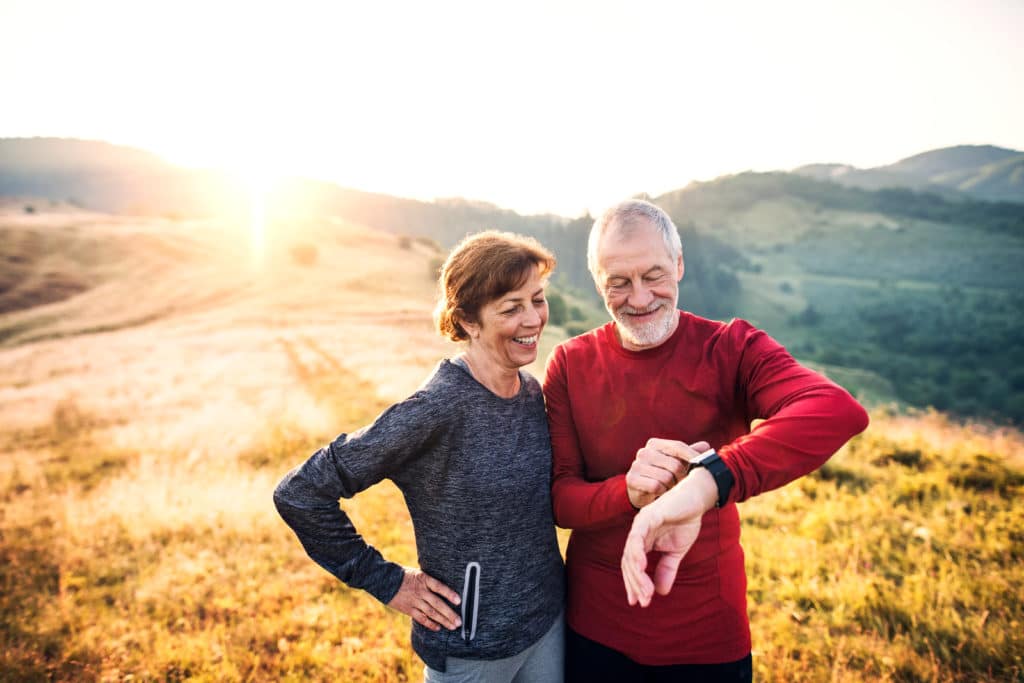Health Tips for Seniors in 2023
![]() January 24, 2023
January 24, 2023
Home > Blog > Senior Living > Health Tips for Seniors in 2023
Naheed Ali, MD, PhD
The past year was difficult for many, and seniors are no exception. With the new year upon us, now is the perfect time for senior citizens to take some steps to ensure they remain healthy in 2023. From eating nutritious meals to setting appointments, we’ll cover everything you need to know to stay in tip-top shape. So, let’s get started.
Please be advised, this is not medical advice. As always, be sure to discuss any questions or concerns with your physician.

Maintaining healthy lifestyle habits
A healthy lifestyle is especially pertinent for senior citizens. As we age, our bodies become more susceptible to certain health conditions, such as heart disease, diabetes, and osteoporosis. A healthy lifestyle can help reduce the risk of these and other age-related health issues, as well as help you maintain independence and peak quality of life. Here are some tips and reminders about how you can achieve a healthy lifestyle:
- Eat a balanced diet: A healthy diet for older adults should include a variety of nutrient-dense foods to support overall health and well-being. Harvard’s Healthy Eating Plate can serve as a visual guide for easier healthy meal planning. Don’t forget to drink plenty of water throughout the day to keep your body functioning properly.
- Exercise regularly: It is recommended that you engage in a combination of aerobic, muscle-strengthening, and balance activities regularly. The Centers for Disease Control and Prevention have guidelines about the duration of each activity and how to achieve these exercise recommendations.
- Get enough sleep: Aim for 7-8 hours of sleep each night to help your body recover and recharge.
- Stay mentally and socially active: Keep your mind active by reading, doing puzzles, or learning a new skill. Maintain connections with friends and family, and consider joining a club or group to meet new people and stay engaged with your community.
- Monitor your health and take safety precautions: Regularly visit your doctor to address any health concerns that may arise early on. Don’t smoke or use tobacco products, and limit your alcohol intake. Stay aware of your surroundings and take the necessary precautions to prevent falls and accidents.
- Manage stress: Chronic stress can contribute to the development of multiple diseases, so it is important to find ways to manage stress, such as through meditation, yoga, or exercise.
Healthy habits if diagnosed with a disease
It can be difficult, but all the more important is to stay in shape as an older adult if you have been diagnosed with the disease. Here are several steps you can take to stay healthy:
- Initiate discussions about your treatment plan: As we age, our priorities often shift towards maintaining or improving the quality of life. By discussing your priorities with your healthcare provider, they can ensure that your care plan is tailored to your individual situation. Doing so will also prevent unnecessary treatments or procedures that are not aligned with your goals and values.
- Follow your treatment plan: Once you and your healthcare providers have come up with a treatment plan, it is important to stick to it. A caregiver or treatment partner can help in this regard by reminding you when to take your medications, refilling your prescriptions, scheduling appointments with the pharmacist or doctor, and assisting with transportation to the clinic.
- Monitor your symptoms: Keep track of your blood sugar levels, blood pressure readings, and any other symptoms related to your conditions.
- Keep your vaccinations up-to-date: Older adults are at higher risk of serious complications from certain infections, so it’s important to keep up to date with vaccines that shield against diseases like the flu, pneumonia, and shingles.
Healthy habits amid the COVID-19 pandemic
Older adults are more vulnerable to the impacts of COVID-19 because of how the body changes as they age. Hence, it is ideal that you observe the following:
- Get vaccinated: It is never too late to get the COVID-19 vaccine. It has been shown to be safe and effective for older adults and can greatly mitigate the risk of severe illness and death from COVID-19.
- Follow minimum public health protocols: Avoid close contact with people who are sick and maintain a distance of at least 6 feet from others in public. Wearing a mask can help reduce the spread of COVID-19, and it is important to wear one in indoor public spaces or when physical distancing is not possible. Wash your hands frequently with soap and water for at least 20 seconds.
- Stay at home: Avoid non-essential travel and outings, and limit visitors to your home. Stay in touch with family and friends via phone or video chat.
- Monitor your symptoms: Watch for signs of COVID-19, such as fever, cough, and shortness of breath, and contact your healthcare provider if you have any concerns.
Remember that the situation with COVID-19 is constantly evolving, and it’s best that you stay informed about the latest recommendations from public health officials and your healthcare provider.
Conclusion
Staying fit and well takes commitment, especially as you age. However, there’s no need to feel daunted by this task: by starting slow and remaining consistent with your lifestyle practices, healthy living eventually becomes a habit. If you have any questions or concerns, be sure to speak with your physician.
As a senior, great health is within your reach.
About the Author
Dr. Ali is a medical journalist and copywriter at HealthcarePropulsion.com.
References
Clegg ME, Williams EA. Optimizing nutrition in older people. Maturitas. 2018;112:34-38.
Colorafi K, Evans B, Lamb G. Engagement With the Plan of Care Among Older Adults With Multiple Cardiac Diagnoses. Qual Health Res. 2021;31(7):1234-1246.
Dautzenberg L, Beglinger S, Tsokani S, et al. Interventions for preventing falls and fall-related fractures in community-dwelling older adults: A systematic review and network meta-analysis. J Am Geriatr Soc. 2021;69(10):2973-2984.
Dzierzewski JM, Dautovich N, Ravyts S. Sleep and Cognition in Older Adults. Sleep Med Clin. 2018;13(1):93-106.
Fu C, Li Z, Mao Z. Association between Social Activities and Cognitive Function among the Elderly in China: A Cross-Sectional Study. Int J Environ Res Public Health. 2018;15(2):231.
Mitchell SJ, Scheibye-Knudsen M, Longo DL, de Cabo R. Animal models of aging research: implications for human aging and age-related diseases. Annu Rev Anim Biosci. 2015;3:283-303.
Mora JC, Valencia WM. Exercise and Older Adults. Clin Geriatr Med. 2018;34(1):145-162.
Powell T, Bellin E, Ehrlich AR. Older Adults and Covid-19: The Most Vulnerable, the Hardest Hit. Hastings Cent Rep. 2020;50(3):61-63.
Repkine A, Lee HC. Determinants of Healthy and Active Ageing in Korea. Int J Environ Res Public Health. 2022;19(24):16802.
Sun V, Puts M, Haase K, et al. The Role of Family Caregivers in the Care of Older Adults with Cancer. Semin Oncol Nurs. 2021;37(6):151232.


